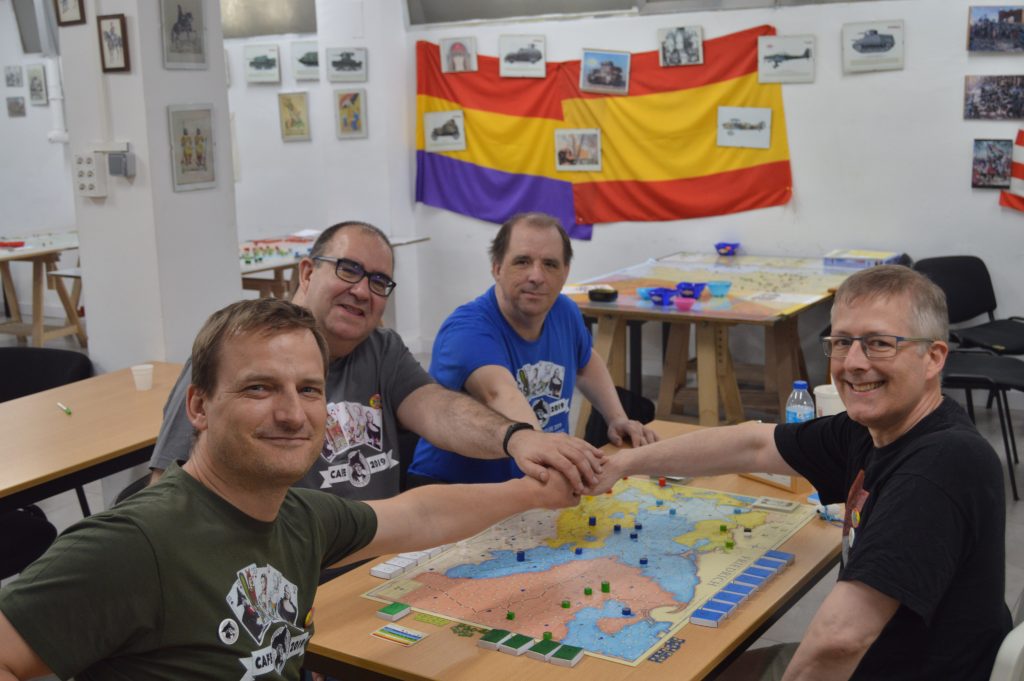
The last game of the heats ended at about four o’clock and after a brief diploma-giving ceremony, the four finalists took their places in order around the table, ready to play the final.
1. Guy Atkinson, winner of the heats, chose to play as Frederick.
2. Alberto Romero opted for Maria Theresa.
3. Anton Telle decided to play as Elisabeth, leaving…
4. last, but not least, Björn von Knorring as Madame Pompadour.
The players are ready, a group photo and let battle commence!
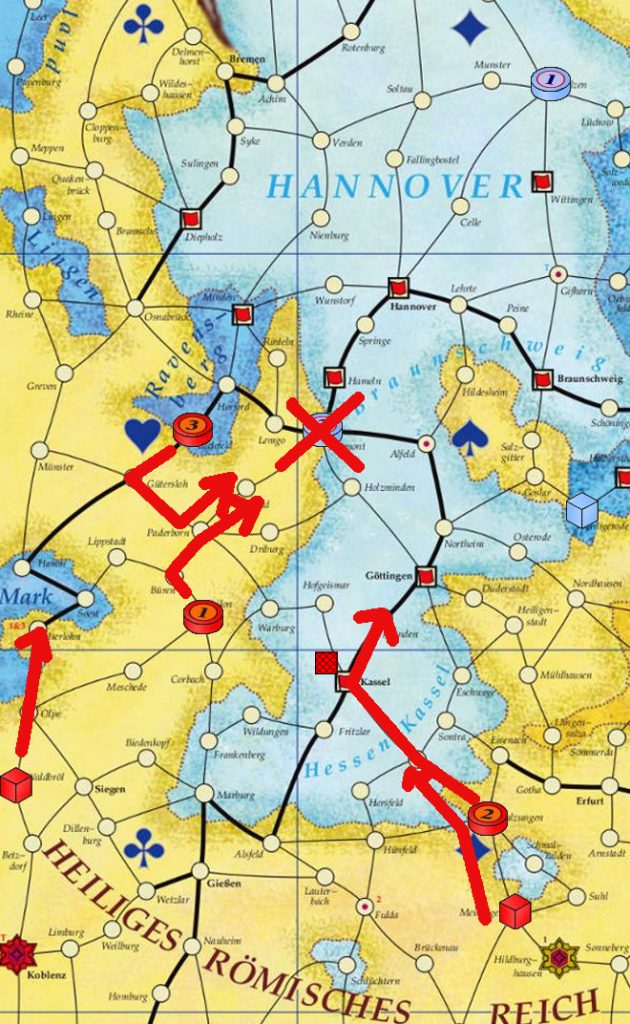
Given that all the finalists are veterans of various championships and between them have won all the prizes and trophies that can be won, it might be expected that the early rounds would be rather uneventful. The opening turn was standard, but there was a surprise waiting at the end of turn two. Confident of success, Guy had positioned Cumberland (H2) in Pyrmont, daring Björn to trade French hearts for Hanoverian spades. Björn immediately took up the challenge and after a brief exchange (we are in turn two, there aren’t many cards available) H2 comes off the board, an event which will weigh heavily in the coming rounds.
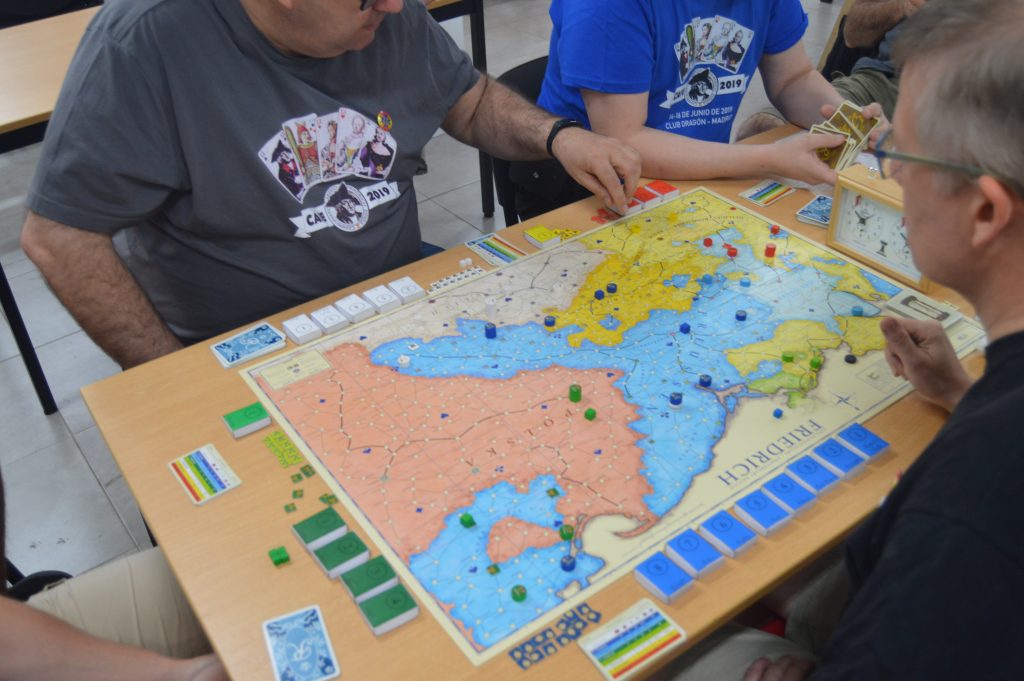
Emboldened, the other allied players wasted no time getting to grips with their common enemy and turn three saw Prussia fighting on all fronts; against Russia in Kammin, where P7 won a four-point victory over R1 and R2 in clubs; and in Silesia P4 and P5 beat off an Austrian triple stack.
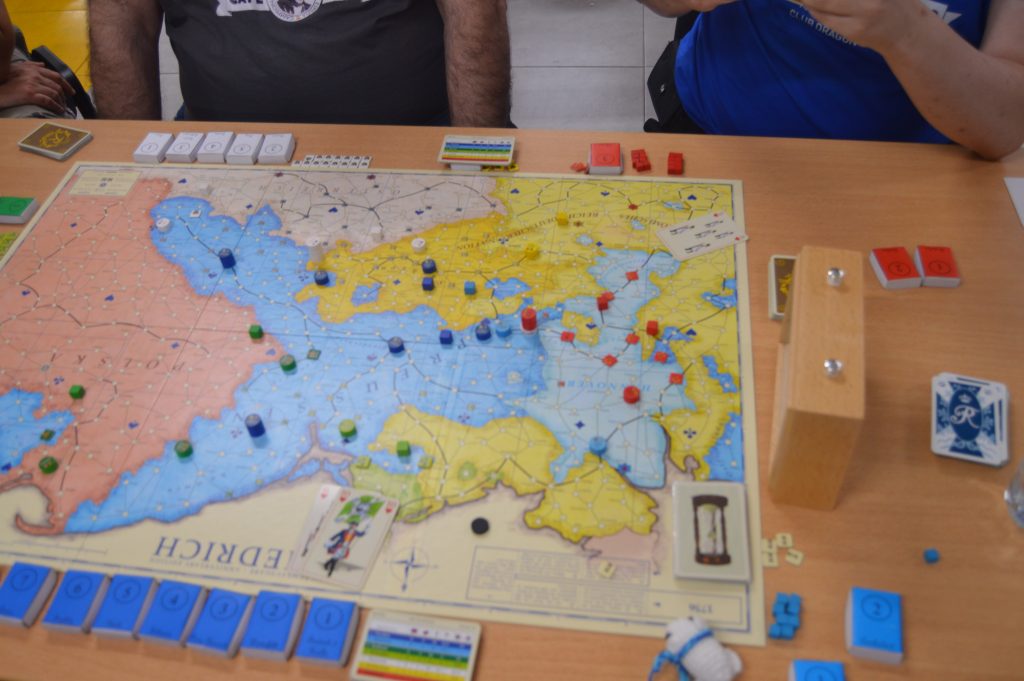
Russia spent the next few turns taking Küstrin and eliminating Lehwaldt (P8) to clear East Prussia, all the while accumulating cards for the coming onslaught. Alberto, perhaps for lack of diamonds, did not immediately launch another attack with his triple stack, but instead marched into the clubs sector between Saxony and Silesia. Laudon (A4) took Cosel in tip of Upper Silesia while Browne (A2) closed on Saxony from the south.
The French are in action too. Guy has placed Ferdinand (H1) on Magdeburg, offering combat to Björn once again, this time Hanover’s hearts for those of France. Again Björn attacks without hesitation with Richelieu and Soubise (F1 and F2). Their sixteen troops prevail and another Hanoverian general comes off the board.
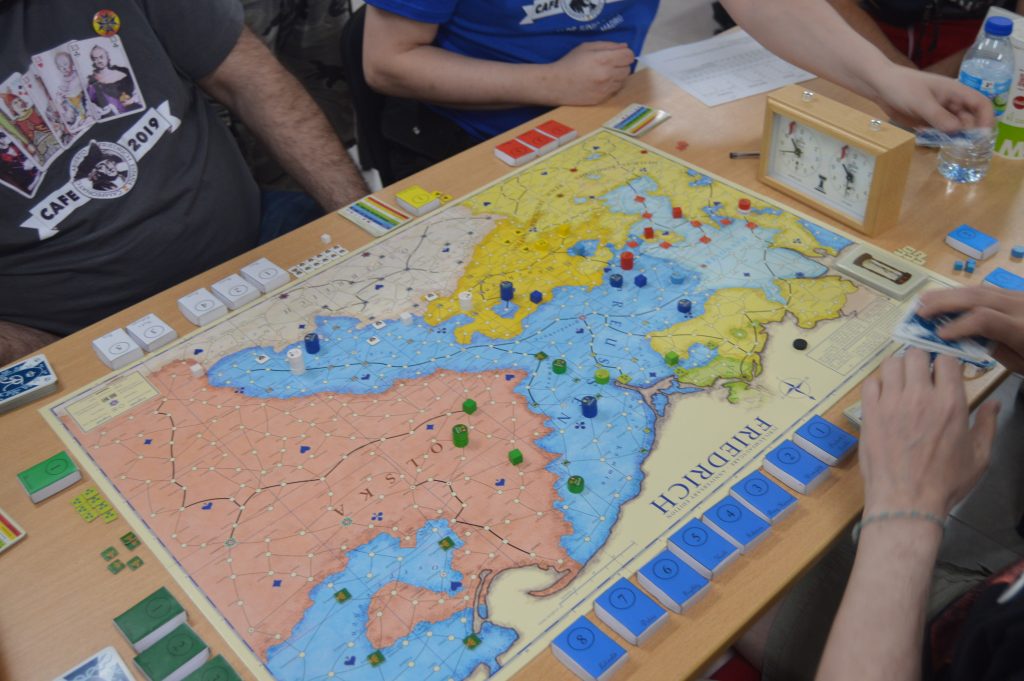
Turn 8: the situation remains threatening around Magdeburg, in Saxony and Silesia, while Russia licks her wounds after suffering a five-point defeat.
The early destruction of Cumberland allows Björn to concentrate two French generals at maximum strength to attack Seydlitz (P6), who only has two troops. By taking small tactical retreats, the French are able to repeatedly make the most of their overwhelming numerical advantage to bleed Guy’s hand of hearts dry, more than making up for the cards spent against Hanover. Björn’s strategy appears to be to take Halberstadt and Magdeburg first before making a final drive to take Wittingen, the last Hanoverian objective still in enemy hands. With Hanover drawing low cards, and hence barely able to replace her heavy losses, Björn has a good chance of winning. He just needs Guy’s hearts to run out…
With this crisis building in the west, Guy managed to stack Heinrich (P3) and Dohna (P7) with nine troops between them in time to face the renewed Russian attacks in turns seven and eight. With only a small numerical advantage, Anton managed to draw some clubs – but not enough to break through. Unfortunately for him, the pressure from the other allies slackened off somewhat. Short of hearts and unwilling to risk exposing his main force to a disastrous rout, Björn withdrew to a safe distance. Alberto split up his triple stack, sending one general towards Saxony while the other two returned to Silesia to join Laudon (A4) in turn eight. Guy sent two generals to reinforce the defence in Saxony to slow the Austrians and prevent the Imperial Army from taking objectives.
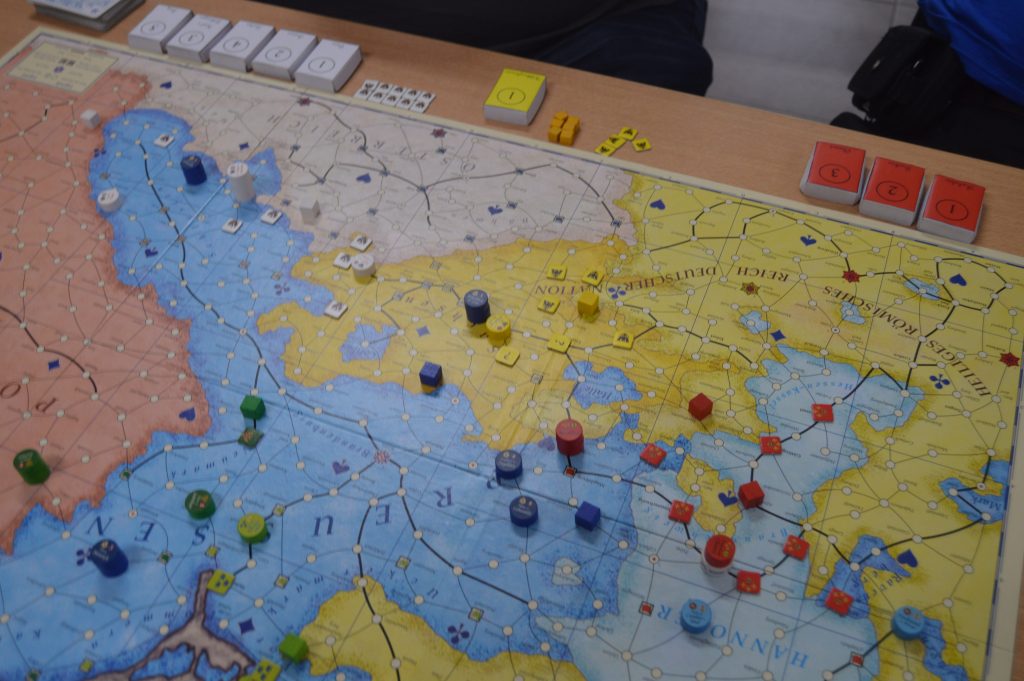
The Imperial Army attacks in turn 12. Note the various areas being defended by Prussian forces and the enemy concentrations around them.
Allied exertions increased again during the next few turns, with constant attacks by all the major powers being beaten off, but only at a high price in cards, which the Prussians could ill afford, especially given the appearance of Lord Bute in turn eleven. Russia tried to dislodge P3 and P7 from Wangerin, while Austria pounded P4 and P5 in the diamonds sector in Silesia. To be able to keep his main force concentrated around Magdeburg, Björn allowed Diepholz to be liberated. Perhaps not a good choice in the heats, but the right thing to do in the final, in which only victory counts. Hildi entered the fray in turn twelve, attacking Friedrich and Winterfeldt (P1 and P2) in Saxony, but was driven off with the loss of four troops.
And just then – as so often happens – Fate intervened decisively. India! And France dropped out in turn 13 (America had already appeared in turn 10). Then one turn later the tsarina died and Russia also left the game. The situation had been turned on its head, with just Poems in turn 16 to compensate slightly for the allied débâcle. Everything now laid in Alberto’s hands. Commanding the only remaining allied major power, would he be able to snatch victory from the jaws of defeat?
Attention turned south to Silesia and Saxony. Up to now Alberto had made slow, but methodical progress which finally seemed to be taking effect; Guy was forced to withdraw Schwerin and Keith to the clubs sector in southeast Silesia to end the massive loss of diamonds caused by the 24 troops of Alberto’s triple stack (Browne, Laudon and Lacy: A2, A4 and A5). Despite the imminent arrival of fresh generals freed up from other sectors, Silesia appears all but lost.
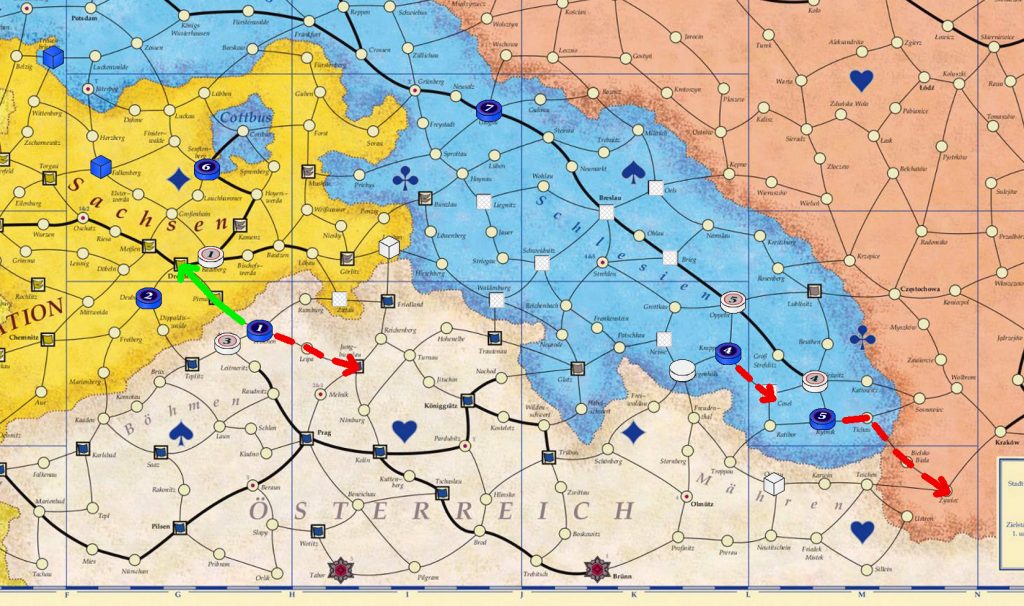
Alberto launches multiples attacks, trying to liberate both Silesia and Saxony. A4 versus P5; A5 versus P4 and A3 versus P1. This last combat turns out to be crucial: Karl defeats Friedrich, who retreats to Jungbunzlau, within range of the central Austrian supply train on which Alberto’s whole plan depends. The dashed red lines in the image below show the retreat paths chosen by Alberto; the solid green line another possible retreat for P1, which would have kept the supply train in Lauban out of harm’s way, significantly improving Austria’s chances.
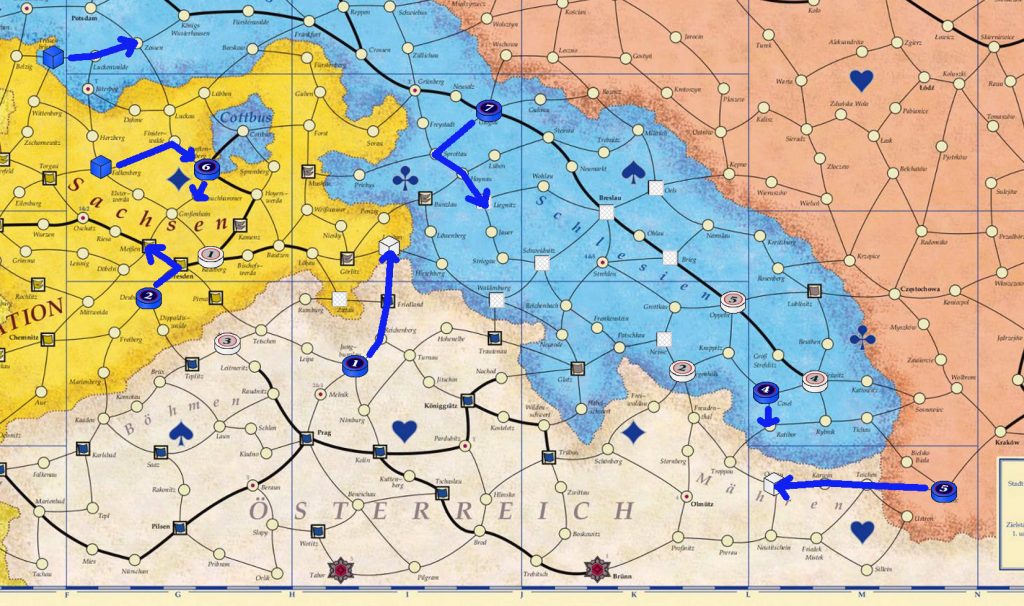
Not one to let such an opportunity go begging, Guy eliminated both Austrian supply trains simultaneously and sent P7 to threaten Liegnitz.
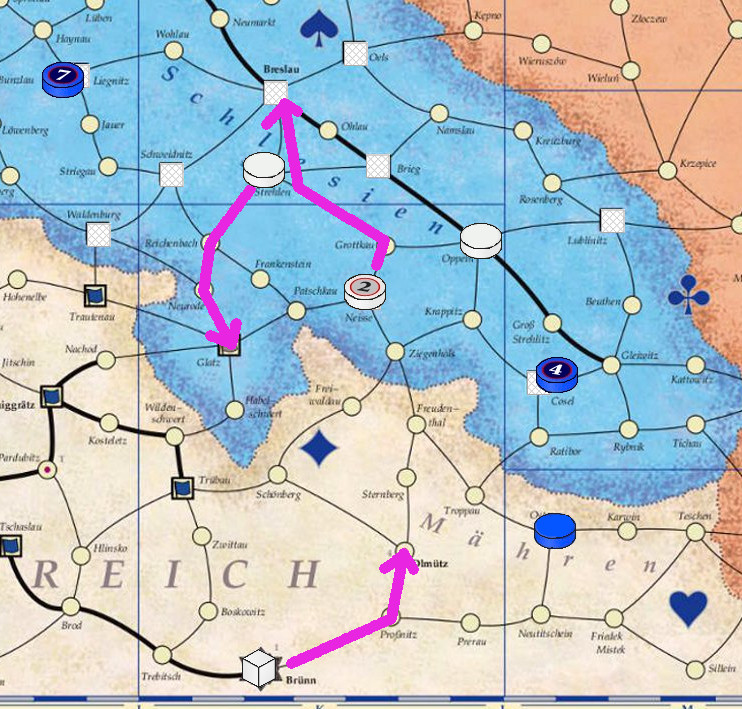
Two turns later, by moving to Strehlen or Breslau, Alberto could have held on to Liegnitz, as shown in the following image.
But instead, he opted to give up Liegnitz and take Glatz.
This was a fatal mistake: with the loss of both supply trains, a number of turns would be needed to recover Liegnitz, while Glatz was always there for the taking. But tiredness and nerves prevented Alberto from seeing things clearly.
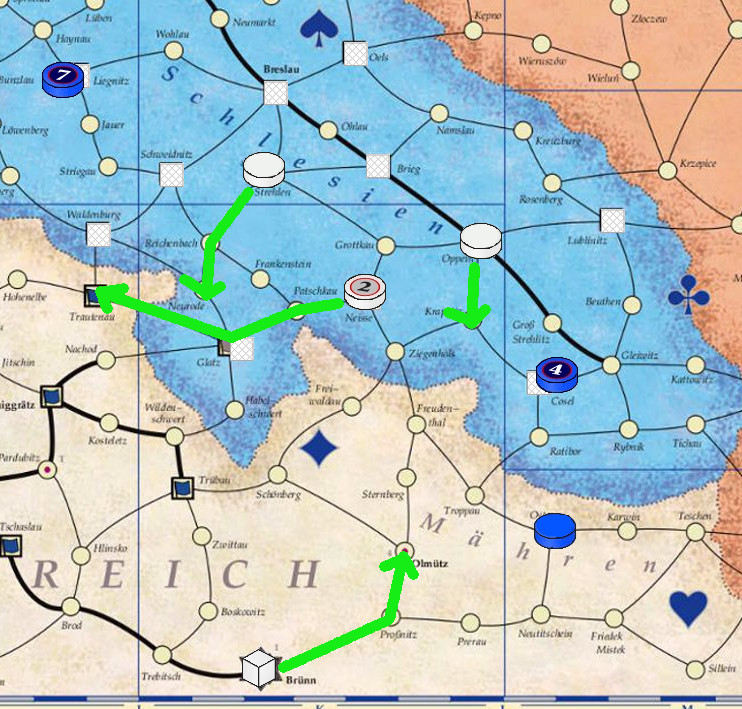
Guy now had the game firmly in hand and held out until turn 21 to become Spanish Friedrich Champion 2019!
RETROSPECTIVE ASSESSMENT
Guy played a pretty conventional game as Prussia, which was precisely his best option to be able – at long last – to win the championship. By using the tried and tested strategies and avoiding unnecessary risks, with a bit of luck – which he had – he would triumph, and so he did.
The only new variant, offering combat against France with Cumberland in turn two, ended in disaster. Although Björn had to spend more hearts than usual before attacking Prussia directly, he was able to concentrate two French generals against the lone, weak Prussian general defending Magdeburg and launch a series of attacks, which might well have cost Guy the game had the Cards of Fate fallen differently. Kudos to Björn for rightly continuing to attack Prussia even when the Hanoverians had recovered somewhat. For a number of turns he had real chances of winning.
Anton also played conventionally. He swept through East Prussia quickly and effectively before gathering his forces to attack with numerical superiority in clubs. But Prussia had a very strong clubs hand and unfortunately for the two-times champion, Elisabeth died before Guy’s luck ran out.
Apart from the mistakes made in the final stages, Alberto barely put a foot wrong. Nevertheless, his early moves where perhaps somewhat hesitant, the triple stack marching to and fro without closing on the enemy and Laudon on his own in Upper Silesia and with him a supply train that might have been better employed elsewhere. The Imperial Army was also left to fend for itself without Austrian support and thus unable to exert much pressure in Saxony. Trivial errors maybe, but only the best players reach the final and you need be on top form to have a good chance of winning.


 Español
Español

